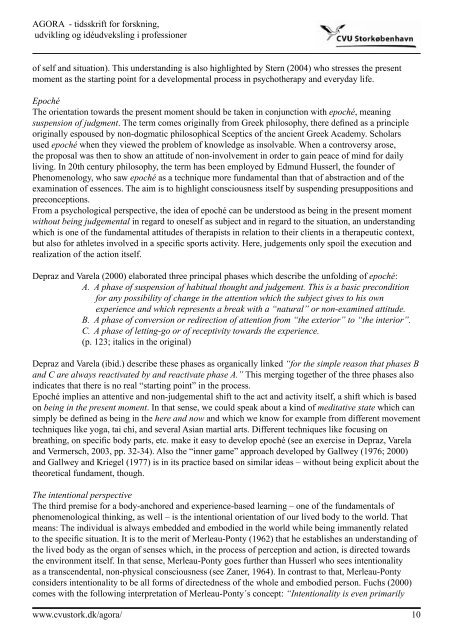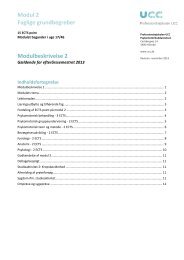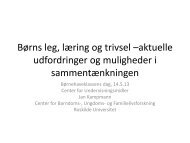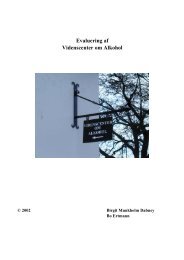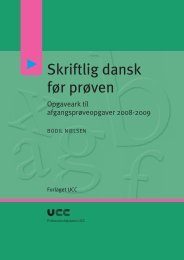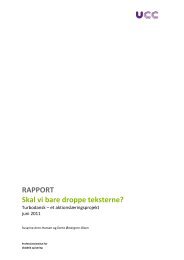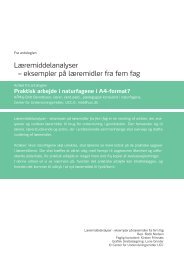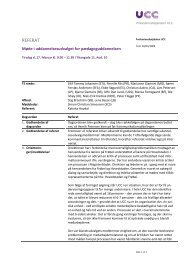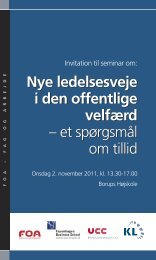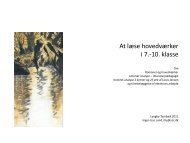AGORA - tidsskrift for forskning, udvikling og idéudveksling i ...
AGORA - tidsskrift for forskning, udvikling og idéudveksling i ...
AGORA - tidsskrift for forskning, udvikling og idéudveksling i ...
Create successful ePaper yourself
Turn your PDF publications into a flip-book with our unique Google optimized e-Paper software.
<strong>AGORA</strong> - <strong>tidsskrift</strong> <strong>for</strong> <strong>for</strong>skning,<br />
<strong>udvikling</strong> <strong>og</strong> <strong>idéudveksling</strong> i professioner<br />
of self and situation). This understanding is also highlighted by Stern (2004) who stresses the present<br />
moment as the starting point <strong>for</strong> a developmental process in psychotherapy and everyday life.<br />
Epoché<br />
The orientation towards the present moment should be taken in conjunction with epoché, meaning<br />
suspension of judgment. The term comes originally from Greek philosophy, there defined as a principle<br />
originally espoused by non-d<strong>og</strong>matic philosophical Sceptics of the ancient Greek Academy. Scholars<br />
used epoché when they viewed the problem of knowledge as insolvable. When a controversy arose,<br />
the proposal was then to show an attitude of non-involvement in order to gain peace of mind <strong>for</strong> daily<br />
living. In 20th century philosophy, the term has been employed by Edmund Husserl, the founder of<br />
Phenomenol<strong>og</strong>y, who saw epoché as a technique more fundamental than that of abstraction and of the<br />
examination of essences. The aim is to highlight consciousness itself by suspending presuppositions and<br />
preconceptions.<br />
From a psychol<strong>og</strong>ical perspective, the idea of epoché can be understood as being in the present moment<br />
without being judgemental in regard to oneself as subject and in regard to the situation, an understanding<br />
which is one of the fundamental attitudes of therapists in relation to their clients in a therapeutic context,<br />
but also <strong>for</strong> athletes involved in a specific sports activity. Here, judgements only spoil the execution and<br />
realization of the action itself.<br />
Depraz and Varela (2000) elaborated three principal phases which describe the unfolding of epoché:<br />
A. A phase of suspension of habitual thought and judgement. This is a basic precondition<br />
<strong>for</strong> any possibility of change in the attention which the subject gives to his own<br />
experience and which represents a break with a “natural” or non-examined attitude.<br />
B. A phase of conversion or redirection of attention from “the exterior” to “the interior”.<br />
C. A phase of letting-go or of receptivity towards the experience.<br />
(p. 123; italics in the original)<br />
Depraz and Varela (ibid.) describe these phases as organically linked “<strong>for</strong> the simple reason that phases B<br />
and C are always reactivated by and reactivate phase A.” This merging t<strong>og</strong>ether of the three phases also<br />
indicates that there is no real “starting point” in the process.<br />
Epoché implies an attentive and non-judgemental shift to the act and activity itself, a shift which is based<br />
on being in the present moment. In that sense, we could speak about a kind of meditative state which can<br />
simply be defined as being in the here and now and which we know <strong>for</strong> example from different movement<br />
techniques like y<strong>og</strong>a, tai chi, and several Asian martial arts. Different techniques like focusing on<br />
breathing, on specific body parts, etc. make it easy to develop epoché (see an exercise in Depraz, Varela<br />
and Vermersch, 2003, pp. 32-34). Also the “inner game” approach developed by Gallwey (1976; 2000)<br />
and Gallwey and Kriegel (1977) is in its practice based on similar ideas – without being explicit about the<br />
theoretical fundament, though.<br />
The intentional perspective<br />
The third premise <strong>for</strong> a body-anchored and experience-based learning – one of the fundamentals of<br />
phenomenol<strong>og</strong>ical thinking, as well – is the intentional orientation of our lived body to the world. That<br />
means: The individual is always embedded and embodied in the world while being immanently related<br />
to the specific situation. It is to the merit of Merleau-Ponty (1962) that he establishes an understanding of<br />
the lived body as the organ of senses which, in the process of perception and action, is directed towards<br />
the environment itself. In that sense, Merleau-Ponty goes further than Husserl who sees intentionality<br />
as a transcendental, non-physical consciousness (see Zaner, 1964). In contrast to that, Merleau-Ponty<br />
considers intentionality to be all <strong>for</strong>ms of directedness of the whole and embodied person. Fuchs (2000)<br />
comes with the following interpretation of Merleau-Ponty´s concept: “Intentionality is even primarily<br />
www.cvustork.dk/agora/ 10


